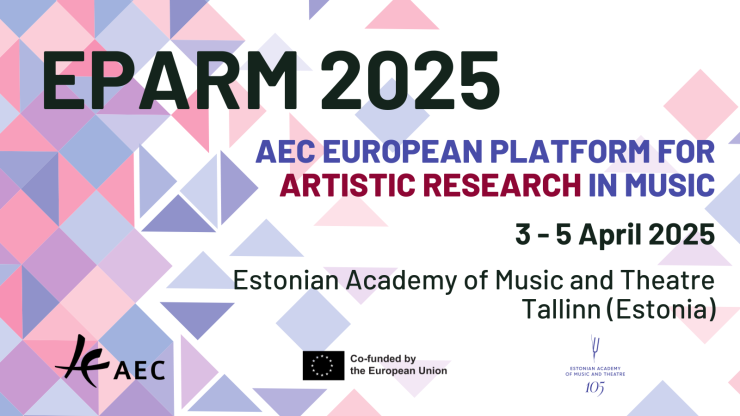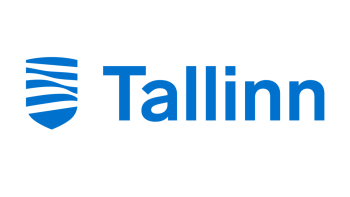The European Platform for Artistic Research in Music (EPARM) is an initiative of the European Association of Conservatoires (AEC), acting as a resource for Artistic Research in the specific context of Higher Music Education: sharing knowledge, insights and outputs; promoting and developing the discourse around Artistic Research; incubating new ideas and developments; and offering support and inspiration to AEC members.
The 12th EPARM conference welcomes music researchers, educators, performers and composers to a three-day exploration of artistic research in music at the Estonian Academy of Music and Theatre in Tallinn (Estonia).
EPARM supports a pluralistic vision of Artistic Research, recognising different possible definitions, methods, and forms of dissemination. Nonetheless, at the core of all such research is the artistic practice itself, which functions not only as an object of study but as a source of significant questions and a means of pursuing original insights. It is an expectation that presentations at EPARM will include performance or the presentation of original work.
Presentations relating to any aspect of Artistic Research in music are welcomed at the 12th EPARM conference, but the peer review panel will prioritise presentations that give some consideration to one or more of the following:
- Artistic Research that draws on, or brings into a new relationship, different musical fields (such as for example, Electroacoustic Music and Early Music) or contexts (such as for example, academic and health contexts)
- The ethics of artistic practice and Artistic Research (for example, viewing them as sources of ethical decision-making)
- How Artistic Research relates to artistic agency (individual and/or collective) in different settings
- The practical and ethical considerations around Artistic Research that is co-created with other researchers, artists, audiences or the wider public.
To reflect the centrality of performance and musical creation in artistic research, the EPARM conference will include a special programme of performances and artistic presentations. Proposals are welcomed for short performances of a maximum of 30 minutes (including up to 10 minutes of introduction and/or contextualization for the audience), which are themselves the outcomes of artistic research. Such performances will be selected for the Performance Programme, with performers contributing to a moderated audience discussion following immediately after the performances. Proposals for the Performance Programme should follow the specific requirements below.
To support the development of excellent Artistic Research at the master’s and doctoral levels, joint applications are invited from students and their supervisors (or other institutional representatives), where the supervisor will engage in a dialogue with the student. Such applications should be focused on the research process, rather than the results and participants opting for this format should indicate this in their proposal (see below); students may also apply to present ‘solo’ in the formats described above.
Proposals for parallel sessions
Proposals for a 20-minute presentation (including any performance or examples) followed by 10 minutes facilitated audience discussion should address a clear question or questions that are rooted in practice.
Proposals should be sent in Word format and should include the following:
-
- Name of the presenter/s (including, if relevant, the supervisor in a student-supervisor dialogue)
- Institution
- 150-word biography
- A title that effectively summarises the presentation for a general audience
- A subtitle that gives the research question/focus area
- 350-word description of the presentation, including:
- A clearly articulated research question, issue or problem, relevant to artistic practice in music
- A clearly articulated and appropriately documented relationship between the artistic practice and the research
- Evidence of a critical approach to the method
- For masters and doctoral students: an indication of whether you are applying with your supervisor and wish your session to be a student-supervisor dialogue; and a letter of support from your supervisor or institution.
Relevant additional audio or video materials are welcome where appropriate.
For the submission please use the template provided in the Documents section below.
Proposals for the Performance Programme
Proposals should clearly address the relationship between the proposed performance and the artistic research of which it is an outcome. The performance should include up to 10 minutes of spoken introduction and/or contextualization of the performance with a total presentation time (introduction and performance) of 30 minutes; the performance will then be followed by 10 minutes of facilitated audience discussion. Performance may be live or, if appropriate, presented by means of high-quality video.
Proposals should be sent in Word format and should include the following:
-
- Name of the performer/s
- Institution
- 150-word biography
- A title that effectively summarises the performance for a general audience
- A subtitle that gives the research question/focus area
- A one-page note on the performance, which will be the basis of the peer-review process and written in a form suitable for distribution to the audience at the performance. In addition to introducing the performance, this note will:
- Clearly articulate the relationship between the performance and the artistic research of which it is an outcome
- Indicate the key questions with which the performance engages
All proposals for performances should include a relevant recording (audio or video) of the proposed performer/s of a maximum duration of ten minutes.
Performance spaces will contain a grand piano, music stands, and an A/V system with a screen and PA. Limited additional equipment can be provided on request, such as a mixing desk, stereo speakers, and microphones. Please indicate the technical requirements in your application.
For the submission please use the template provided in the Documents section below.
Peer Review
A peer review panel composed of the EPARM Working Group members will select those submissions that will be featured in the EPARM conference. The panel will seek additional expert input when necessary.
Timetable
The timetable for this process is as follows:
- 2 October 2024: Circulation of the call
- 4 November 2024: Deadline for submissions
- 9 December 2024: Results communicated to the applicants (who are required to confirm participation by 13 December)
- Mid-December 2024 – Mid-January 2025: Publication of the programme of EPARM 2025 and registration launch
- 3 – 5 April 2025: EPARM 2025
Proposals must be submitted in Word format using the provided template and should be sent to AEC Events Coordinator Beatriz Laborda at the following email address: beatrizlaborda@aec-music.eu
Any submissions that do not follow the guidelines above will not be considered.
N.B: Selected applicants will be required to register as participants and therefore pay the corresponding fee according to the price category (Representative of an AEC member institution / Representative of a non-AEC member institution / Independent researcher – not affiliated to any institution)








